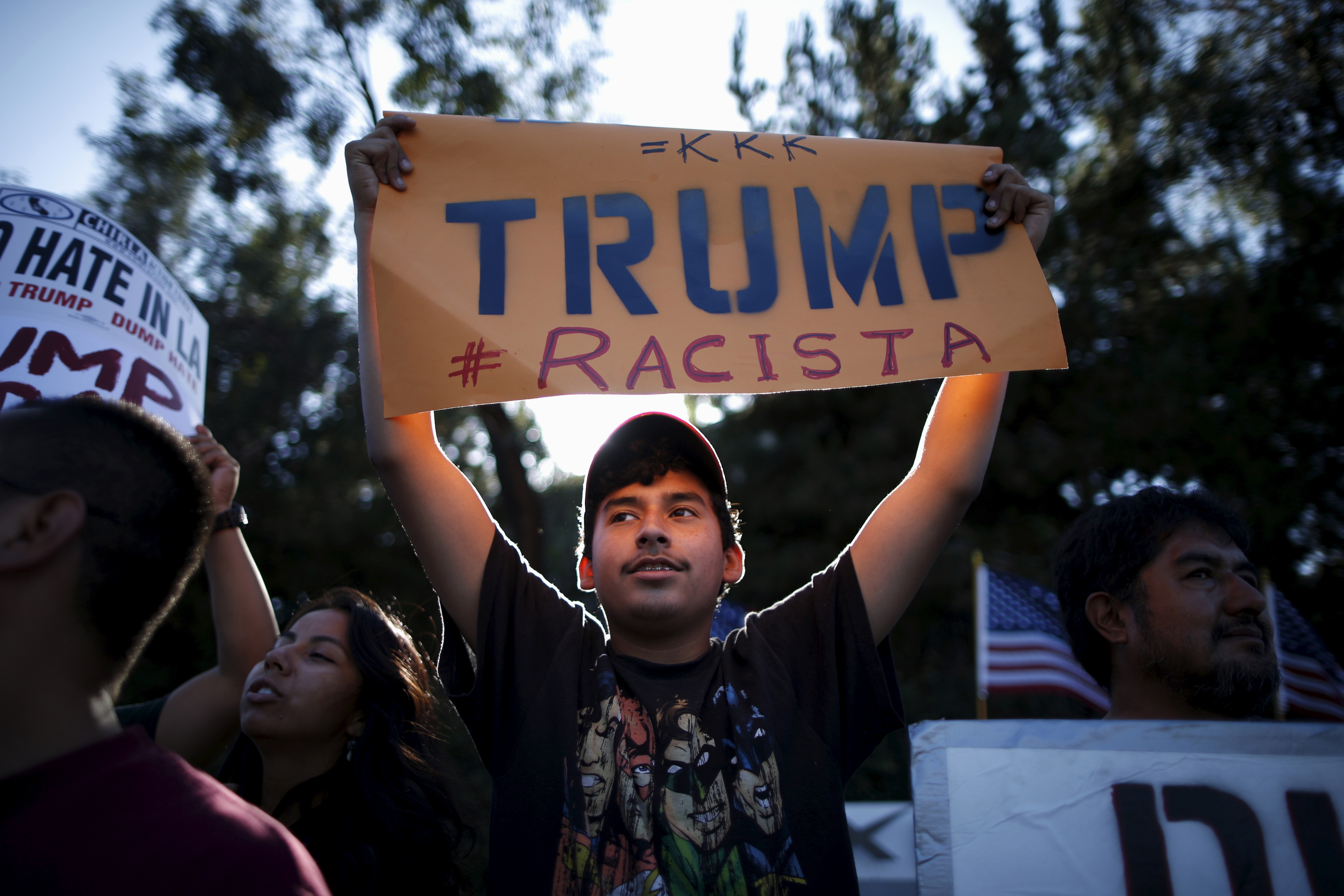Are immigrants America's best defense against tyranny?
Latinos can thwart Donald Trump and save America from itself, as James Madison envisioned


One reason Republicans, the self-proclaimed guardians of limited government, typically cite for not wanting more Hispanics in the U.S. is their affinity for big government. But conservatives need to look in the mirror: Given the rise of Donald Trump, the greatest danger of big government would not be the Democratic welfare state, but the Republican police state. And Hispanics might be the group best positioned to deny him his vision.
It is true that Hispanics are no great friends of limited government. Polls show that 34 percent more Hispanics support a "big government that provides more services" than the general public. This has prompted The Manhattan Institute's Heather Mac Donald to all but call Hispanics the enemies of economic freedom who would lead to the demise of limited government. (Other conservative restrictionists likewise worry that immigrants from non-Western countries or non-liberal democracies will erode the national consensus against a meddlesome government.)
But pointing fingers at the ideological impurity of immigrants betrays a stunning lack of appreciation for the architecture of American pluralism erected by James Madison. For starters, Hispanics are hardly the only ones susceptible to the allure of big government handouts. Using government to extract special favors is a natural human tendency against which Americans, despite nearly 250 years of a constitutionally constrained government, haven't been immunized.
Subscribe to The Week
Escape your echo chamber. Get the facts behind the news, plus analysis from multiple perspectives.

Sign up for The Week's Free Newsletters
From our morning news briefing to a weekly Good News Newsletter, get the best of The Week delivered directly to your inbox.
From our morning news briefing to a weekly Good News Newsletter, get the best of The Week delivered directly to your inbox.
Family value conservatives want special tax breaks for nuclear families. Millennials want government censorship of speech to create "safe spaces." Corporations want subsidies to pad their bottom lines. The GOP's white working class base, even more than the Democratic union vote, wants restrictions on trade to protect their jobs. (Over 10 percent more Republicans than Democrats said this summer that free trade has hurt the country. Nor was this a temporary surge of anti-Obama animus. More Republicans have been showing antipathy to trade than Democrats for the last 15 years.)
But Madison foresaw the eternal demands for such government interventionism. Indeed, in his Federalist 10 he noted that so long as the "reason of man [remains] fallible and he is at liberty to exercise it," powerful factions will try to secure their interests by using the strong arm of government. However, the solution wasn't, in his view, to "give every citizen the same opinion" (presumably either through the ideological indoctrination of native-born Americans or an ideological litmus test for foreign-born Americans). It was the opposite: expand the republic's size and population in order to "multiply the factions."
"Freedom arises from the multiplicity of sects which pervades America," he remarked elsewhere.
This great diversity wouldn't be able to stop every advance of government every time. Federal spending, after all, has increased from about 2 percent of the GDP in Madison's time to 20 percent now. But it would make it harder for demagogues to command a permanent majority for enduring mischief.
This is exactly the role that Hispanics, along with other immigrants, might play against Trump.
In a few short months, Trump has vastly grown America's appetite for draconian government. He has proposed rounding up millions of undocumented Latinos and evicting them en masse. He is determined to close mosques. He wants to massively expand surveillance of Americans and has even flirted with issuing identification cards to Muslims. "Trump's proposals have gone from overt prejudice to things literally taken out of late Weimar history," as The Week columnist Ryan Cooper has noted.
Regardless of who eventually becomes the GOP nominee, he or she will have a very hard time yanking all the red meat that Trump has dangled before the Republican base. Ben Carson, another presidential candidate not distinguished by his sobriety on policy issues, has endorsed Trump's call for monitoring mosques and churches. He is having second thoughts about Trump's suggestion to create a special national registry for Muslims, but thinks that one for all immigrants would be a swell idea. Other Republican candidates might hate Trump's guts, but that doesn't mean that they can ignore his poisonous prescriptions. There is no doubt that his presence has forced them to harden their stance against immigrants, "welfare-mooching" Hispanics, Syrian refugees, and Muslims. If Republicans take control of the White House while holding on to both houses of Congress in this sulfurous climate, an ugly government crackdown can hardly be ruled out, especially should there be another terrorist attack on American soil.
But Latinos are well positioned to thwart the Republican bid for the presidency and save America from itself. They came out in droves in swing states and defeated Mitt Romney in 2012 after his tough talk against them. Republicans will need Latinos even more badly in the 2016 election, since Latinos will constitute an even larger share of the voting-age public. (Some credible estimates suggest that Republicans will need 42 to 47 percent of the Latino vote, in contrast to George Bush's 40 percent, to win the White House). But it is hard to see any scenario, even one where Marco Rubio is the nominee, in which they can pull that kind of Latino support after their far nastier tone in this primary.
The reason that FDR got away with his mass internment of Japanese Americans in World War II was that the foreign born made up less than 7 percent of the population then. Now they are close to 13 percent. This makes them a more formidable electoral force against government excesses, just as Madison had envisioned.
Madison was much too realistic to simply rely on an ideological commitment to limited government to limit government. He put his faith in pluralism and a diverse electorate to check the tyranny of the majority. To the extent that a strong immigrant presence adds factions against such tyranny, it strengthens — not weakens — his scheme, restrictionist fear-mongering notwithstanding.
A free daily email with the biggest news stories of the day – and the best features from TheWeek.com
Shikha Dalmia is a visiting fellow at the Mercatus Center at George Mason University studying the rise of populist authoritarianism. She is a Bloomberg View contributor and a columnist at the Washington Examiner, and she also writes regularly for The New York Times, USA Today, The Wall Street Journal, and numerous other publications. She considers herself to be a progressive libertarian and an agnostic with Buddhist longings and a Sufi soul.
-
 The origins of the IDF
The origins of the IDFIn Depth The IDF was formed by uniting Zionist paramilitary groups, WWII veterans and Holocaust survivors
-
 Deadly fungus tied to a pharaoh's tomb may help fight cancer
Deadly fungus tied to a pharaoh's tomb may help fight cancerUnder the radar A once fearsome curse could be a blessing
-
 Codeword: June 27, 2025
Codeword: June 27, 2025The Week's daily codeword puzzle
-
 The JFK files: the truth at last?
The JFK files: the truth at last?In The Spotlight More than 64,000 previously classified documents relating the 1963 assassination of John F. Kennedy have been released by the Trump administration
-
 'Seriously, not literally': how should the world take Donald Trump?
'Seriously, not literally': how should the world take Donald Trump?Today's big question White House rhetoric and reality look likely to become increasingly blurred
-
 Will Trump's 'madman' strategy pay off?
Will Trump's 'madman' strategy pay off?Today's Big Question Incoming US president likes to seem unpredictable but, this time round, world leaders could be wise to his playbook
-
 Democrats vs. Republicans: who are the billionaires backing?
Democrats vs. Republicans: who are the billionaires backing?The Explainer Younger tech titans join 'boys' club throwing money and support' behind President Trump, while older plutocrats quietly rebuke new administration
-
 US election: where things stand with one week to go
US election: where things stand with one week to goThe Explainer Harris' lead in the polls has been narrowing in Trump's favour, but her campaign remains 'cautiously optimistic'
-
 Is Trump okay?
Is Trump okay?Today's Big Question Former president's mental fitness and alleged cognitive decline firmly back in the spotlight after 'bizarre' town hall event
-
 The life and times of Kamala Harris
The life and times of Kamala HarrisThe Explainer The vice-president is narrowly leading the race to become the next US president. How did she get to where she is now?
-
 Will 'weirdly civil' VP debate move dial in US election?
Will 'weirdly civil' VP debate move dial in US election?Today's Big Question 'Diametrically opposed' candidates showed 'a lot of commonality' on some issues, but offered competing visions for America's future and democracy
